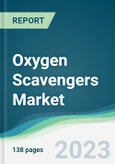The global oxygen scavengers market was valued at US$8.325 billion in 2021 and is expected to grow at a CAGR of 8.77% to reach US$14.999 billion by 2028.
Oxygen scavengers are substances added to products or systems to prevent oxygen from causing oxidation, corrosion, and other unwanted reactions. The demand for oxygen scavengers is driven by their ability to protect products and systems from the harmful effects of oxygen, including spoilage, degradation, and contamination. Oxygen scavengers are used in a wide range of industries, including food and beverage, pharmaceuticals, and oil and gas, among others. The oxygen scavengers market is highly competitive, with numerous companies offering various products and services.The oxygen scavenger market is expected to grow during the projected period, driven by increasing demand from key industries such as food and beverage and water treatment and technological advancements in oxygen scavengers. Furthermore, factors such as increasing environmental concerns and stricter regulations regarding the use of certain chemicals may also impact the market for oxygen scavengers.
The oxygen scavengers market is driven by the increasing demand from the food and beverage industry and the growing requirement for corrosion prevention.
The food and beverage industry is a major consumer of oxygen scavengers due to the need to preserve product quality and extend shelf life. Oxygen can cause oxidation and spoilage of food and beverages, leading to a deterioration of taste, texture, and nutritional value. Consumer preferences are shifting towards fresher and healthier products, so the demand for oxygen scavengers to maintain product integrity is expected to rise.Further, corrosion poses a significant challenge in various industries, including oil and gas, water treatment, and manufacturing. Oxygen scavengers play a vital role in preventing corrosion by minimizing the presence of oxygen, which is a key factor in the corrosion process. As industries strive to protect their infrastructure, equipment, and pipelines from the detrimental effects of corrosion, the demand for effective oxygen scavengers is expected to increase. The National Association of Corrosion Engineers (NACE) estimates that corrosion costs the global economy billions of dollars annually. Industries such as oil and gas, water treatment, and manufacturing invest significant resources in corrosion prevention measures. Using oxygen scavengers to minimize the presence of oxygen and prevent corrosion is a recognized practice supported by industry standards and guidelines.
Market Developments:
- In February 2020, Aptar CSP Technologies unveiled a revolutionary active packaging solution that combines the capabilities of oxygen scavenging and moisture adsorption. By leveraging their patented 3-phase Activ-Polymer™ platform within the Activ-Film™ product configuration, this pioneering technology delivers dual protection for moisture- and oxidation-sensitive drug products. This solution effectively addresses stability concerns while simplifying packaging processes, enabling pharmaceutical companies to enhance drug stability, expedite product development, and accelerate time-to-market.
- In May 2021, Avient introduced Colormatrix Amosorb 4020R, an oxygen scavenger additive explicitly developed to optimize the utilization of up to 100 percent recycled PET (rPET) content. Differentiating itself from traditional nylon-containing alternatives, this additive delivers consistent oxygen scavenging performance across varying levels of rPET content. Previously, in May 2020, the company also launched ColorMatrix Amosorb 4020G, an oxygen scavenger for PET rigid packaging that diverges from traditional nylon-based options. This advanced product offers a significantly clearer appearance, boasting a remarkable 50 percent reduction in haze compared to previous grades, all while maintaining dependable oxygen-scavenging performance.
The non-metallic oxygen scavengers segment will witness robust growth over the forecast period.
The non-metallic oxygen scavengers segment is experiencing significant growth and is expected to continue expanding over the forecast period. Non-metallic oxygen scavengers offer numerous advantages, making them increasingly popular in various industries. The pharmaceutical industry is a major contributor to the growth of non-metallic oxygen scavengers. Oxygen-sensitive drugs and medications require proper packaging to maintain their efficacy and stability. Non-metallic scavengers provide a reliable solution by actively absorbing oxygen and protecting pharmaceutical products from degradation.North America accounted for a significant share of the global oxygen scavengers market in 2021.
Based on geography, the oxygen scavengers market is segmented into North America, South America, Europe, Middle East and Africa, and Asia Pacific. North America is widely recognized for its exceptional research and development capabilities within the packaging industry. The region remains at the forefront of continuous technological advancements in oxygen-scavenging technologies, spearheading the development of novel materials and formulations. These cutting-edge innovations have significantly propelled the adoption of oxygen scavengers across various sectors, including food, pharmaceuticals, and consumer goods. The fast-paced lifestyle and demanding schedules of consumers in North America have fostered a substantial rise in the demand for convenience foods. In this context, oxygen scavengers play a pivotal role by ensuring quality preservation and extending the shelf life of packaged convenience foods. By meeting consumer expectations for freshness and taste, oxygen scavengers have become instrumental in satisfying the ever-growing demand from the convenience food sector.Market Segmentation:
BY TYPE
- Metallic Oxygen Scavengers
- Non-Metallic Oxygen Scavengers
BY END-USER INDUSTRY
- Energy and Power
- Oil & Gas
- Chemical
- Food & Beverage
- Healthcare
- Pulp & Paper
- Others
BY GEOGRAPHY
- North America
- USA
- Canada
- Mexico
- South America
- Brazil
- Argentina
- Others
- Europe
- Germany
- France
- United Kingdom
- Spain
- Others
- Middle East and Africa
- Saudi Arabia
- UAE
- Israel
- Others
- Asia Pacific
- China
- India
- South Korea
- Indonesia
- Thailand
- Taiwan
- Others
Table of Contents
Companies Mentioned
- Chemfax
- Ocean Chemicals
- Avient
- MITSUBISHI Gas Chemical America, Inc.
- BASF
- Clariant Chemicals
- Ecolab Inc.
- Accepta Water Treatment Chemicals
- Arkema
- Suez Water Technologies & Solutions








